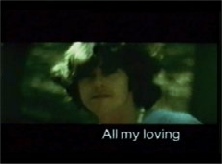
TV Pop Diaries
Pop Music on British Television 1955 -
"A film of pop music."
Shown as a part of BBC1's Omnibus arts strand and directed by Tony Palmer it was UK TV's first serious look at the alternative pop scene.
Palmer filmed pop acts in the UK and USA between 1967 and 1968 almost as an act of
self-
Palmer had previously met John Lennon in 1963 after a press conference which Palmer
was covering for Cambridge student paper Varsity, and it was to Lennon he turned
to for help in assembling a list of people to talk to. Lennon duly provided him with
a list of names and introductions. Cream, Lulu, The Beatles, Grapefruit, The Moody
Blues, Manfred Mann, Frank Zappa, Pink Floyd, The Who, Donovan, Jimi Hendrix Experience,
Eric Burdon & The Animals, were all featured. many of them were interviewed and only
too be happy for once to be shown in an serious, intellectual and respectful manner.
But unlike A Whole Scene Going which dared to ask questions of our Pop Gods All My
Loving merely provided mostly non-
Clips of the Vietnam and Nigerian wars were spliced in to poor, tasteless and puzzling effect, giving the impression that the film was mocking or targeting the musicians and their fans, rather than trying to understand them. The Daily Mirror review asked "Juxtaposing a blazing napalm victim with say Jimi Hendrix on a rampage of guitar smashing is a vulgarity justified only if the point being made is a valid one." If the BBC wanted to use vulgarity to explain pop then surely Ken Russell was your man. A concluding montage of sound and images featuring Hitler and Rasputin only served to confound and bemuse.
After its completion it sat on the shelf for six months, eventually being shown to
John Culshaw, ex-
Some of the footage was recycled in Palmer's All You Need Is Love series for ITV in 1976, while a DVD of the show was released in 2007, albeit cropped for widescreen, however it does include an interview with Palmer as a bonus feature.
ALL MY LOVING
BBC1
3rd November 1968
